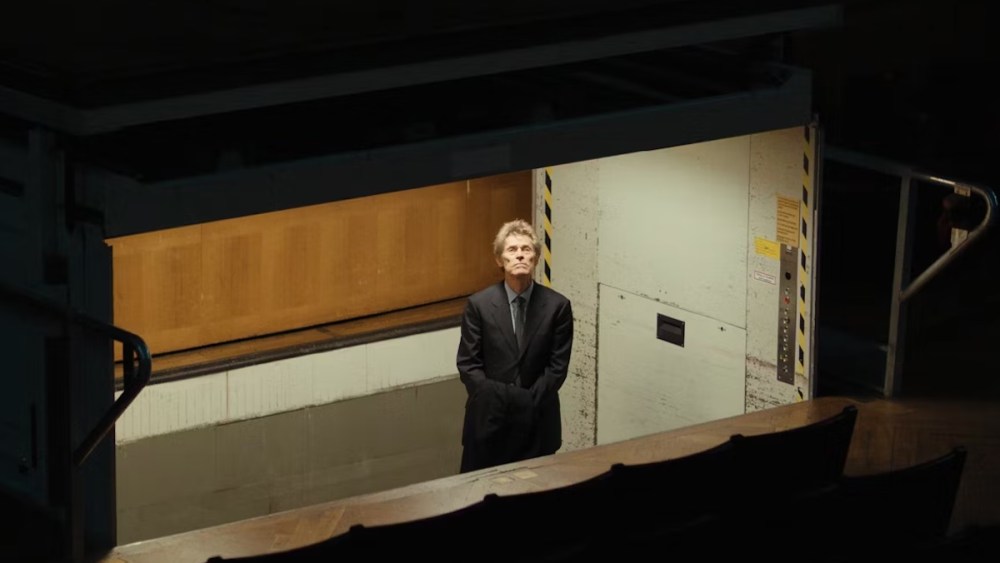Gastón Solnicki’s latest film “The Souffler” is, like his previous work, entrancing and mercurial. There is a straightforward plot here (a hotel manager learns his place of employment will soon be no more), but the Argentine filmmaker uses such a threadbare storyline to string together a broader meditation about a changing world. Told through clipped vignettes around and about said hotelier and his staff, the collaboration between Solnicki and Willem Dafoe — a bleak, black comedy that’s impressionistic in style and substance — is an utter delight.
When Lucius (Willem Dafoe) learns that the Intercontinental Hotel in Vienna he’s been managing for decades has been sold to an Argentinean (played by Solnicki) and will soon be redeveloped, he’s stunned, enraged and, the more he thinks about it, perhaps a tad melancholy. He understands deep down that the loss of the illustrious if rather run-down building is a symptom of something larger. The hotel — as a symbol of a city, a country, a continent even — risks being lost to oblivion. No more guests skating in its nearby rink. No more signature cocktails served at its lavish bar. No more soufflés making their way to those white-linen tables at its restaurant.
Then again, if the soufflés coming out of the kitchen are any indication, the Vienna Intercontinental should really have its days numbered. As a metaphor for the decline of a decades-old hotel of this size, the dish is both blunt and poetic. The same goes for the snippets of routine Solnicki samples. Although Dafoe’s Lucius does end up waging a bit of a futile, farcical war against said foreign developer, “The Souffleur” (co-written with Julia Niemann) is not really concerned with issues of plot and story. This is a film interested instead in details that capture the loss and loneliness Lucius cannot seem to escape.
Portuguese cinematographer Rui Poças — who lensed films as disparate as “Grand Tour,” “Frankie,” “Zama” and “The Ornithologist” — creates textured, tender portraits of characters set against gorgeous vistas that crowd and expand them. Turning his keen eye on Dafoe and the Intercontinental Hotel with studied still frames, Poças encourages audiences to appreciate the spaces Lucius inhabits, whether he’s spraying water over the rink, sitting alone in the perfectly set restaurant or playing a game of chess with his daughter (Lilly Senn) on the rooftop. As the film unfolds, Lucius slowly begins to lose whatever footing he had in a hotel that seems to be falling into disarray faster than he can make an argument for its historical (let alone financial) value.
But while such a description would suggest Solnicki’s latest film is a languorous project about faded glory and the encroaching violence of global capitalist modernity, that is selling “The Souffleur” short — mostly because with Dafoe at the helm, the Vienna-set project has a wry sensibility throughout. The Hollywood actor’s devilish features and unmistakable crackling voice make for a pitch-perfect pair with Solnicki’s sardonic sensibility. Much as Wes Anderson and Yorgos Lanthimos have plumbed Dafoe’s deliciously wicked sense of humor in pieces that straddle the line between the real and the archly stylized, Solnicki understands that a strong Dafoe performance must always teeter between the two. And so, while his Lucius carries on his shoulders the responsibility to stand up to Solnicki’s Facundo, he’s also a character whose winking personality makes him wholly enjoyable to watch (and listen to) throughout. A late scene where he takes utter delight in messing up the hotel’s electricity and lighting is but one example of how hilariously petty he makes this weathered hotel manager without ever making him a maudlin fool.
Dafoe, who’d been itching to work with the Argentine filmmaker for quite some time, clearly relished the chance to make this collaboration a fruitful one. Their scenes together, where Lucius and Facundo fail to talk to one another (as the former doesn’t speak Spanish and the latter knows no English) are some of the funniest in the film. They’re proof positive the two accomplished a rare kind of alchemy here, speaking across cultures and languages to create a character study that’s more and more unique the more it gets away from language and story.
“The Souffleur” reflects Solnicki at his most accomplished. This is a film that further establishes him as a filmmaking voice unlike any other. “I don’t like order; I don’t like disorder,” Lucius says during one of the film’s many voiceovers. “I like a combination of the two.” He may as well be describing Solnicki’s approach.
The vignettes that make up the film feel at once painstakingly organized and quite improvisational in spirit. There’s an instinctual stitching that binds its many scenes together that build to a heartwrenching ending, culminating in neither a whimper nor a bang but a welcome sigh of relief. Solnicki has created a sly and slippery kind of film that, much like its leading actor’s grin, is hilarious and devastating in equal measure.

